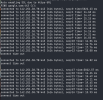I have some weird network delay from within Ubuntu Linux 22.04 LTS running inside bhyve with NAT access via IPFilter.
Some of the connections got like delayed or something. Attached is a screenshot of the HTTP ping (`httping` package), and below is the statistics:
Compare it to the http_ping running on the host FreeBSD at the same time:
It's perfect!
My ipnat rule is simple:
(192.168.35.0/24 - is the network of the virtual machines).
I'm trying to make some sense out of it for a few days now - any help would be so much appreciated!!!
Some of the connections got like delayed or something. Attached is a screenshot of the HTTP ping (`httping` package), and below is the statistics:
Code:
--- https://google.com/ ping statistics ---
41 connects, 38 ok, 7.32% failed, time 141423ms
round-trip min/avg/max = 13.9/278.9/5022.6 msCompare it to the http_ping running on the host FreeBSD at the same time:
Code:
--- https://google.com http_ping statistics ---
60 fetches started, 60 completed (100%), 0 failures (0%), 0 timeouts (0%)
total min/avg/max = 18.358/20.4176/48.891 ms
connect min/avg/max = 5.162/5.57232/7.295 ms
response min/avg/max = 13.011/14.7933/43.43 ms
data min/avg/max = 0.039/0.0520167/0.086 msIt's perfect!
My ipnat rule is simple:
Code:
map igb0 192.168.35.0/24 -> 0/32 portmap tcp/udp auto(192.168.35.0/24 - is the network of the virtual machines).
I'm trying to make some sense out of it for a few days now - any help would be so much appreciated!!!
Attachments
Last edited:

